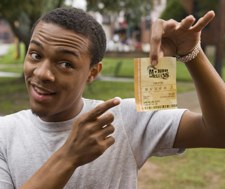REVIEW: Lottery Ticket Trades Its Urban Nerve for Easy Charm
 Erik White wanted the housing projects in Lottery Ticket, his fractious wish-fulfillment comedy, to look like an "Everywhere, USA" that would be relatable to all. Though he envisioned the story taking place in his hometown of New York City, circumstance led him to shoot in Atlanta, Georgia, largely on a complex of soon-to-be demolished projects with a pink-bricked, benignly institutional look. He carefully shot around any identifying signs or landmarks, ensuring that his generic, non-specific, ultimately unsatisfying take on a bullet-proof concept -- an 18-year-old Foot Locker employee wins the lottery but is forced to wait out a long weekend within the cutthroat ecosystem of his community before he can claim the prize -- is reflected in its hermetic, alienating aesthetic.
Erik White wanted the housing projects in Lottery Ticket, his fractious wish-fulfillment comedy, to look like an "Everywhere, USA" that would be relatable to all. Though he envisioned the story taking place in his hometown of New York City, circumstance led him to shoot in Atlanta, Georgia, largely on a complex of soon-to-be demolished projects with a pink-bricked, benignly institutional look. He carefully shot around any identifying signs or landmarks, ensuring that his generic, non-specific, ultimately unsatisfying take on a bullet-proof concept -- an 18-year-old Foot Locker employee wins the lottery but is forced to wait out a long weekend within the cutthroat ecosystem of his community before he can claim the prize -- is reflected in its hermetic, alienating aesthetic.
As it happens, Georgia ranks 15th in the world (out of 179 operating lotteries) in terms of lottery sales, making it especially hospitable to the frenzy White sets up around the Mondo Millions Lottery's $370 million jackpot. But as the film goes on it becomes clear that his two interests -- comedic fantasy and grounded social satire -- are working against each other. The paradox that veteran screenwriters know well is that the higher the degree of specificity you give to a social or emotional dynamic, the more relatable it becomes. First-timer Abdul Williams makes it to the base camp of that paradox and then lets the gifted cast struggle on without definitive guidance, dropping one-liners like breadcrumbs along the way.
A bouncy opening introduces us to the adorable, upright Kevin Carson (Bow Wow) and the various people he runs into while trying to get to work. There is his Jesus freak grandma (Loretta Devine); his high strung id, a/k/a his best friend Benny (Brandon T. Jackson); the village yenta, Semaj (played with the perfect blend of oil and vinegar by Charlie Murphy); Mr. Washington (Ice Cube, who also executive produces), the basement-dwelling designated bogeyman; the local talent, a callow beauty named Nikki (Teairri Mari); and the thug-in-residence, Lorenzo (Gbenga Akinnagbe), who demands that Kevin bring him a few pairs of the latest Air Jordans as a just-got-out-of-jail present.
The block is buzzing over the lottery, and the line for tickets at the corner store is long. Kevin calls the government-sponsored gambling ring a "tax on poor people," and he's right, although that's as far as the film gets in its examination of the popularity of the lottery in low-income communities, or the obsession with status markers like cars, jewelry and shoes. Social hot buttons pop up but go unpushed throughout the film; instead they are played for easy, point-and-look laughs.
Fired from his Foot Locker job after Lorenzo ambushes the store, Kevin is talked into buying a ticket by a store clerk (a very funny T-Pain). When White relaxes the stereotypical shorthand and gives his chorus of characters some slack, the film is at its most deftly illustrative: Kevin's first instinct, upon learning that he has the winning ticket, is to hide the news from his neighbors; several sharp, funny scenes depicting the supportive/suffocating axis those neighbors live along function less clumsily than the others to establish the film's unique milieu. It's possible I preferred the group scenes because they forced White, a video veteran and first-time feature director, to back his ass up a little bit. Without the group dynamic or a chase scene to inform his direction, he defaults almost exclusively to disorienting close-ups; too much of Lottery Ticket looks like Mr. Magoo jacked a Flip camera and wandered into the projects.
At its worst the film is subject to tonal disconnects (several times things get very violent, very fast) and random add-ons (an ill-conceived subplot involving a gangster loan shark played by Keith David) that are only barely mitigated by brief appearances by Mike Epps as a crooked preacher and Terry Crews as a lightweight henchman. More helpful is Ice Cube's endearing performance as an aged sparring partner of Leon Spinks and Muhammad Ali who provides cover and advice for Kevin as he tries to hold onto both his wits and the ticket.
Thump, as he is called, claims he was driven into his home after being robbed right on his porch many years before. "Why should I go outside?" he says. "Ain't nothing out there but drug dealers." Uh, wrong movie, Thump. Out there is a craven but ultimately harmless, wish-fulfilling PG-13 world where a young man learns a lesson about money, morality, and making a difference. This is an "Everywhere" that, for intriguing, occasionally amusing better and disappointing, formulaic worse, looks a lot like Hollywood, USA.
